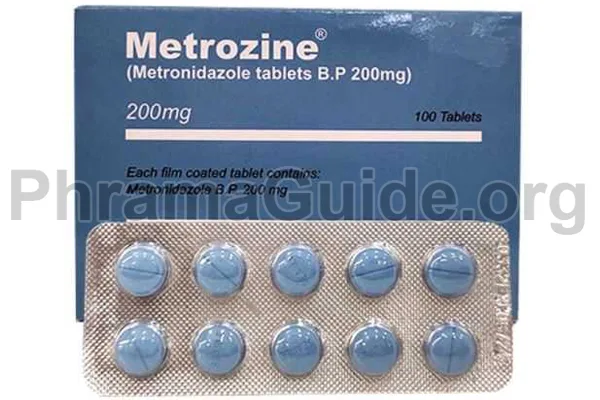Metrozine is an antibiotic commonly used to treat various bacterial and parasitic infections. Like many medications, it can have side effects, which can vary in terms of frequency and severity. Here are common and less common side effects of Metrozine.
Common Side Effects
- Nausea and vomiting: Gastrointestinal upset is one of the most common side effects of Metrozine. Taking the medication with food can help reduce these symptoms.
- Metallic taste: Many people taking Metrozine report a metallic or bitter taste in their mouth.
- Diarrhea: Diarrhea can occur as a result of Metrozine use, as it can disrupt the balance of intestinal bacteria.
- Abdominal cramps and discomfort: Some individuals may experience mild abdominal pain and discomfort.
Less Common Side Effects
- Headache: Headaches can occur as a side effect of Metrozine, but they are less common than gastrointestinal symptoms.
- Dizziness: Some people may experience dizziness or lightheadedness while taking Metrozine.
- Dry mouth: A less common side effect may include a dry or unpleasant taste in the mouth.
- Nervous system effects: In rare cases, Metrozine can lead to neurologic side effects, such as peripheral neuropathy, which can cause tingling or numbness in the extremities. This is more likely to occur with high-dose, prolonged use of the medication.
- Allergic reactions: While rare, some individuals may experience allergic reactions to Metrozine, such as skin rash, itching, swelling, or difficulty breathing. Seek immediate medical attention if you experience these symptoms.
- Blood disorders: Metrozine can rarely affect blood cells, potentially leading to disorders like neutropenia (low white blood cell count) or thrombocytopenia (low platelet count).

What is Metrozine?
Metrozine is one of the leading brands of Metronidazole, manufactured and marketed by Searle Pakistan (Pvt) Ltd.
Metrozine : Available Formulations and Strengths
Presently, Metrozine is available in Tablet, Injectable, and Syrup forms.
Metrozine Tablets : 200mg, 400mg Strengths.
Metrozine Injection : 500mg/100ml strength.
Metrozine Syrup : 200mg/5ml strength.
What Are The Possible Drug Interactions of Metrozine?
- Alcohol: Metrozine can cause a disulfiram-like reaction when combined with alcohol. This reaction includes symptoms such as severe nausea, vomiting, flushing, and rapid heart rate. It’s important to avoid alcohol while taking Metrozine and for at least 48 hours after finishing the course of the medication.
- Anticoagulants (blood thinners): Metrozine may increase the effect of anticoagulants like warfarin, potentially leading to an increased risk of bleeding. If you are taking an anticoagulant, your healthcare provider may need to adjust your dose and monitor your blood clotting parameters more closely.
- Lithium: Metrozine can increase lithium levels in the blood, potentially leading to lithium toxicity. If you are taking lithium, your healthcare provider may need to adjust your lithium dose and closely monitor your lithium levels.
- Certain drugs metabolized by CYP450 enzymes: Metrozine can interact with drugs that are metabolized by specific cytochrome P450 (CYP450) enzymes. These interactions can affect the metabolism and blood levels of various medications. For example, Metrozine may increase the levels of drugs like phenytoin and coumarin anticoagulants.
- Antidiabetic medications: Metrozine can affect blood sugar levels and may require adjustments to antidiabetic medications if you have diabetes.
- Disulfiram: Taking Metrozine with disulfiram can lead to a severe disulfiram-like reaction, similar to the reaction caused by alcohol. This combination should be avoided.
- Medications that affect liver enzymes: Some drugs that affect liver enzymes, like rifampin, can alter the metabolism of Metrozine. Your healthcare provider may need to adjust the dosage of Metrozine in such cases.
- Medications that affect the nervous system: Metrozine may enhance the effects of drugs that affect the central nervous system, potentially leading to dizziness and other side effects. These medications may include certain sedatives and tranquilizers.

Leave A Comment